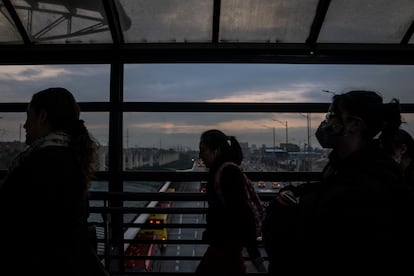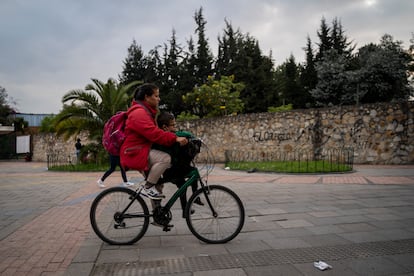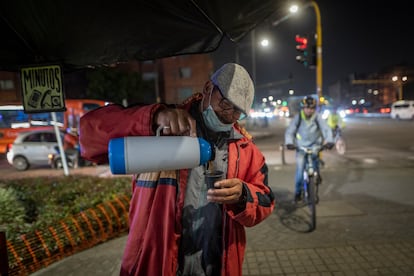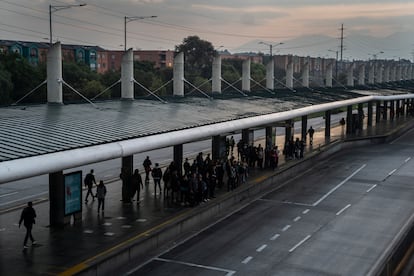Why do Colombians get up earlier than everyone else in the world?
An OECD report indicates that on average people in Colombia wake up at 6:31 a.m., the result of cultural and religious customs. But is is also the least productive nation among the 38 members of the bloc


First off, a word of warning: this article is not going to provide a single answer to the question all Colombians ask themselves: “Why do we get up so early?” There are several reasons and none of them is definitive. Custom, religion and geographic location are all some of the factors as to why the alarm clock goes off at 5 a.m. every day in Yurlenis Moya’s house; why she and her five-year-old son get on their bicycles and pedal through a city still shrouded in darkness to get to school at 6:15 a.m.; why they won’t see each other again until 13 hours later, when she gets off work and picks him up at his grandmother’s house in a daily routine that will surprise no reader in Colombia, but which in most other countries is inconceivable.
A report by the Organization for Economic Co-operation and Development (OECD) states that Colombia is the world’s earliest riser. On average, Colombians open their eyes at 6:31 a.m. By comparison, in the United States the median is 7:20 a.m., in China it is 7:42 a.m. and in Spain, 8:05 a.m. Honor or punishment? For many Colombians, getting up early is synonymous with discipline, commitment, effort and hard work. But the OECD report contradicts that panorama: Colombia is also the least productive country in the world despite early starts and one of the longest working weeks worldwide at 48 hours per week, the same as in Mexico. The government of Gustavo Petro is seeking to reduce the working week to 42 hours through a labor reform bill presented this week, but Colombia’s pre-dawn ritual is another matter.

Well-known stories of proud early risers are commonplace. Members of Álvaro Uribe’s administration talk of calls from the former president at 4:30 a.m. and the official government website profile of Juan Camilo Restrepo, appointed Peace Commissioner in 2021, still notes he is a “disciplined and an early riser.” These two officials serve as examples of how the culture of the early riser — which traditionally was more common in rural areas and the center of the country — eventually spread to the rest of Colombia. Nobody gets up earlier than a Paisa: residents of Colombia’s northwest. In Medellín, for example, university classes start at 6 a.m.
At the beginning of the 20th century, Colombia began to industrialize. In 1900, around 75% of Colombians lived in rural areas; by 1980 the situation was reversed and 75% of the population was living in cities. Schools, factories, and companies flourished, but the timetables remained the same as they had when most of the workforce were laboring in the coffee plantations. Historian Pablo Rodríguez explains that the transition from the countryside to the city was an extraordinarily fast one. “Customs and mentalities do not change so quickly; people just took their working hours with them. And in the countryside, people work from dawn until dusk.”
Average wake-up time (am):
— World of Statistics (@stats_feed) March 11, 2023
🇨🇴Colombia- 6:31
🇮🇩Indonesia- 6:55
🇯🇵Japan- 7:09
🇲🇽Mexico- 7:09
🇩🇰Denmark- 7:19
🇺🇸US- 7:20
🇩🇪Germany- 7:25
🇧🇷Brazil- 7:31
🇨🇦Canada- 7:33
🇬🇧UK- 7:33
🇮🇳India- 7:36
🇨🇳China- 7:42
🇹🇷Turkey- 8:02
🇪🇸Spain- 8:05
🇷🇺Russia- 8:06
🇬🇷Greece- 8:25
🇸🇦S. Arabia- 8:27
An article written in 2016 by Camilo Andrés Salcedo of the National University of Colombia, titled “Family Strategies, Work and Origins of Small Coffee Producers in Huila, Colombia” includes an interview with a grower who said: “With the five children we picked 300 arrobas [25 pounds / 11.5 kilograms] a week, which was 30,000 pesos [around $6.4] And that was a lot of money. That’s why I made my children get up early and work like boars.” Work in the fields traditionally began as soon as the sun rose. In the coffee plantations, the country’s main economic driver for decades, work began as soon as the color of the beans, between green and ripe red, could be made out.
Colombia is an equatorial country: there are no seasons and no altering of the clocks. Throughout the year, the sun rises at around 6 a.m. and sets at around 6 p.m. “Colombians suffer from an advanced sleep phase; they go to bed with the chickens and wake up with the rooster,” says Dr. Steve Amado, president of the Colombian Association of Sleep Medicine (ACMES). For adults, he explains, this may not have notable consequences if they consolidate a schedule to get enough sleep, but it can cause problems for children.

Initiatives to ensure schoolchildren sleep for longer have multiplied in recent years in several countries. There is a scientific basis behind them: numerous studies claim that delaying school start times would improve student performance. In 2019, the United States pushed back high school start times to 8:30 a.m. In 2009, Bogotá decided that the youngest schoolchildren should arrive at public schools at 7:30 a.m. instead of 6:30 a.m. In Colombian private schools, there is little respite from the alarm clock. Most of these centers are located on the outskirts of the main cities, so it is not uncommon to see children taking the bus before the sun has risen to get to class by 7 a.m., when the school day usually starts.
The ACMES plans to sign an agreement with the NGO Start School Later, a movement that was founded in the U.S., to start a campaign and raise awareness about the need to reach new agreements on schedules to benefit children. It is not a straightforward issue. Children start school early because their parents start work early, so it would be necessary to change the entire system to accommodate both.

In cities like Bogotá, the problem is exacerbated by traffic. The Colombian capital ranks fifth on the list of the cities with the highest traffic delay times in the world, according to the INRIX 2022 Global Traffic Scorecard. In addition, the supply of public transport does not meet demand. To get to work on time, thousands of people spend hours commuting around the city. And if they have children, they need schools that open very early so they can drop them off earlier.
Religion is another factor in one of the most Catholic countries in the world. “There are a series of symbolic traditions at the religious level that have permeated popular culture, especially among rural workers, who have no problem waking up at 4 a.m.,” says sociologist Carlos Charry. These are values of sacrifice, in which laziness is considered a cardinal sin.
Science, though, refutes these ideas. In an interview with EL PAÍS, physiologist María Ángeles Bonmatí said that for “most people, getting little sleep will mean being much less productive in their daily lives and having their physical and cognitive capacities diminished.” The OECD report plows a similar furrow. Increasingly, more and more voices are being raised against the old adage “the early bird catches the worm,” that is so often repeated in Colombia.
Sign up for our weekly newsletter to get more English-language news coverage from EL PAÍS USA Edition
Tu suscripción se está usando en otro dispositivo
¿Quieres añadir otro usuario a tu suscripción?
Si continúas leyendo en este dispositivo, no se podrá leer en el otro.
FlechaTu suscripción se está usando en otro dispositivo y solo puedes acceder a EL PAÍS desde un dispositivo a la vez.
Si quieres compartir tu cuenta, cambia tu suscripción a la modalidad Premium, así podrás añadir otro usuario. Cada uno accederá con su propia cuenta de email, lo que os permitirá personalizar vuestra experiencia en EL PAÍS.
¿Tienes una suscripción de empresa? Accede aquí para contratar más cuentas.
En el caso de no saber quién está usando tu cuenta, te recomendamos cambiar tu contraseña aquí.
Si decides continuar compartiendo tu cuenta, este mensaje se mostrará en tu dispositivo y en el de la otra persona que está usando tu cuenta de forma indefinida, afectando a tu experiencia de lectura. Puedes consultar aquí los términos y condiciones de la suscripción digital.








































